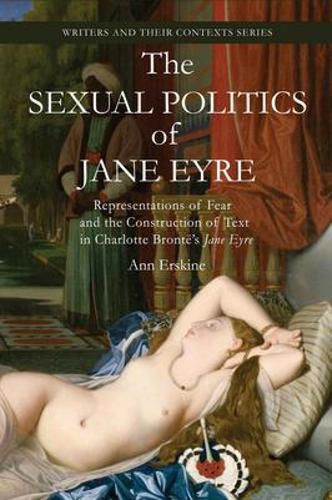Readings Newsletter
Become a Readings Member to make your shopping experience even easier.
Sign in or sign up for free!
You’re not far away from qualifying for FREE standard shipping within Australia
You’ve qualified for FREE standard shipping within Australia
The cart is loading…






Very few new books have the power to change our view of a great classic like Jane Eyre. But this is such a book. It offers a genuinely new way of reading the novel.
It offers a radical rethinking that differs from previous explorations of Jane Eyre from both feminist and post-colonial positions.
Dr. Erskine is well acquainted with a wide range of relevant literary criticism and she challenges in particular the dominant feminist argument that Jane is primarily motivated by rage. She provides a close reading of Jane Eyre from a new perspective, namely that Jane is from the beginning motivated by fear - and specifically by fear of sexual subjugation.
Her analysis of the text clearly supports her proposition that the child Jane’s occasional outbursts of anger and retaliation are a last resort when she is goaded beyond endurance, but that her primary reaction to the world is one of fear. This is a direct challenge to what has become a feminist orthodoxy in literary criticism, namely that Jane is intrinsically a rebellious character primarily motivated by rage. This reading is much better supported by the text than the more dominant reading of Jane as rebellious from the start. Dr. Erskine argues that Jane should be seen as a timid, fearful child who, as a mature woman, overcomes fear and rebels against oppressive societal structures. This contrasts with prevailing feminist depictions of Jane Eyre as a feisty, rebellious child who, as an adult, subsides into a patriarchal marriage. This alternative perspective provides a reading of the novel’s conclusion as more aesthetically satisfactory and unified than many previous scholars have proposed.
Dr. Erskine supports her arguments by close and pertinent quotation from the text, and by details of the novel’s cultural and historical context which, again, are not often remarked on. In particular she emphasizes that Jane’s references to ‘slavery’ to express the subjugation she feels in relation to John Reed (and later to Mr. Rochester), are not drawn from African/Caribbean slavery but from widely publicized stories of ‘white slavery’ perpetrated by Ottoman privateers in repeated raids during the eighteenth and nineteenth centuries, even along the coast of the British Isles. Tellingly, these attacks were particularly frequent in Cornwall, the home of Charlotte Bronte’s mother and aunt, who would be familiar with the stories of local terror and would almost certainly have passed these on to their children. The Turkish theme of sexual threat is maintained in Jane Eyre by repeated scenes of ‘Turquerie’ or harem-like opulence in relation to Mr Rochester.
The author’s background in clinical psychology makes her very well placed to analyse emotional motivations and particularly those evoked by emotional trauma such as terror.
$9.00 standard shipping within Australia
FREE standard shipping within Australia for orders over $100.00
Express & International shipping calculated at checkout
Very few new books have the power to change our view of a great classic like Jane Eyre. But this is such a book. It offers a genuinely new way of reading the novel.
It offers a radical rethinking that differs from previous explorations of Jane Eyre from both feminist and post-colonial positions.
Dr. Erskine is well acquainted with a wide range of relevant literary criticism and she challenges in particular the dominant feminist argument that Jane is primarily motivated by rage. She provides a close reading of Jane Eyre from a new perspective, namely that Jane is from the beginning motivated by fear - and specifically by fear of sexual subjugation.
Her analysis of the text clearly supports her proposition that the child Jane’s occasional outbursts of anger and retaliation are a last resort when she is goaded beyond endurance, but that her primary reaction to the world is one of fear. This is a direct challenge to what has become a feminist orthodoxy in literary criticism, namely that Jane is intrinsically a rebellious character primarily motivated by rage. This reading is much better supported by the text than the more dominant reading of Jane as rebellious from the start. Dr. Erskine argues that Jane should be seen as a timid, fearful child who, as a mature woman, overcomes fear and rebels against oppressive societal structures. This contrasts with prevailing feminist depictions of Jane Eyre as a feisty, rebellious child who, as an adult, subsides into a patriarchal marriage. This alternative perspective provides a reading of the novel’s conclusion as more aesthetically satisfactory and unified than many previous scholars have proposed.
Dr. Erskine supports her arguments by close and pertinent quotation from the text, and by details of the novel’s cultural and historical context which, again, are not often remarked on. In particular she emphasizes that Jane’s references to ‘slavery’ to express the subjugation she feels in relation to John Reed (and later to Mr. Rochester), are not drawn from African/Caribbean slavery but from widely publicized stories of ‘white slavery’ perpetrated by Ottoman privateers in repeated raids during the eighteenth and nineteenth centuries, even along the coast of the British Isles. Tellingly, these attacks were particularly frequent in Cornwall, the home of Charlotte Bronte’s mother and aunt, who would be familiar with the stories of local terror and would almost certainly have passed these on to their children. The Turkish theme of sexual threat is maintained in Jane Eyre by repeated scenes of ‘Turquerie’ or harem-like opulence in relation to Mr Rochester.
The author’s background in clinical psychology makes her very well placed to analyse emotional motivations and particularly those evoked by emotional trauma such as terror.